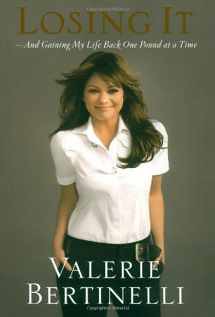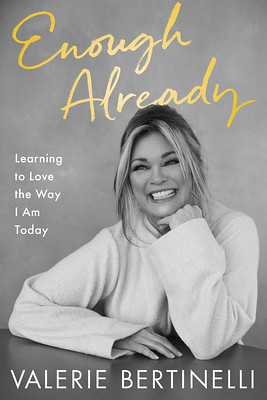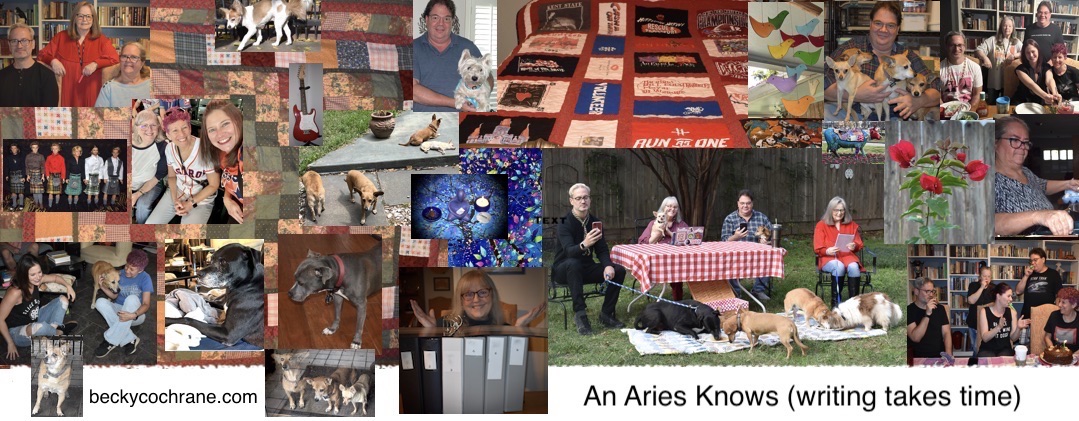Saw this on Instagram, likely a repost from Twitter*:

Like Ware, I could not quit laughing.
*I reserve the opportunity to express my feelings about Twitter at some later date.
This is as good a time as any to recap what I’ve read this month. I do have another book to read, but at more than 500 pages, it’s unlikely I’ll have finished it by the first day of January.
Though December’s reading includes only one work of fiction (i.e., “making it up as they went along”), I think even in the realm of nonfiction, writers shape a narrative in a creative way. More about that in a moment.
First up, fiction in the form of a cozy mystery:
 Bones of Holly is the 25th (!) in Carolyn Haines’s Sarah Booth Delaney series. It’s set on the Mississippi Gulf Coast, a few years after the devastation from Katrina, with the memory of that hurricane delicately woven through it. Enjoyable as always to experience these characters, and it made me think a lot about Three Fortunes in One Cookie, even to the point of having a conversation with Timothy about that novel. We rarely look back at the books we had published, but that one continues to nag me for a few reasons.
Bones of Holly is the 25th (!) in Carolyn Haines’s Sarah Booth Delaney series. It’s set on the Mississippi Gulf Coast, a few years after the devastation from Katrina, with the memory of that hurricane delicately woven through it. Enjoyable as always to experience these characters, and it made me think a lot about Three Fortunes in One Cookie, even to the point of having a conversation with Timothy about that novel. We rarely look back at the books we had published, but that one continues to nag me for a few reasons.


 I’d very much wanted to read Valerie Bertinelli’s Enough Already: Learning to Love the Way I Am Today, published this year, but I also wanted context for it. So first I read Losing It: And Gaining My Life Back One Pound at a Time, 2008, then Finding It: And Satisfying My Hunger for Life without Opening the Fridge, 2009. If I pare down the journey of her life in a three-word soundbite: Food, Family, and Fame, as an older reader, I sometimes felt like I understood young Valerie better than she understood herself (in an everywoman kind of way). In the third, current-day book, with both of us older and more mature, her growth and perceptions have been tempered by a lot of loss and a greater self-acceptance.
I’d very much wanted to read Valerie Bertinelli’s Enough Already: Learning to Love the Way I Am Today, published this year, but I also wanted context for it. So first I read Losing It: And Gaining My Life Back One Pound at a Time, 2008, then Finding It: And Satisfying My Hunger for Life without Opening the Fridge, 2009. If I pare down the journey of her life in a three-word soundbite: Food, Family, and Fame, as an older reader, I sometimes felt like I understood young Valerie better than she understood herself (in an everywoman kind of way). In the third, current-day book, with both of us older and more mature, her growth and perceptions have been tempered by a lot of loss and a greater self-acceptance.
You might guess that my own interest was based on my enduring affection for Eddie Van Halen, and it was with some relief I read how their story is dramatically different from the fiction I’m writing. Years ago, I borrowed Eddie’s smile and drew on a little of his charm for my musician, but my character’s love story (with a woman nothing at all like Valerie) is all their own. (Maybe not nothing, as my female, like Valerie, enjoys sports, but I took that from one of my own real-life friends before I learned it about Valerie.)

Then I read three works from a young woman I met/follow/interact with on Instagram, Shilo Niziolek. I enjoy her photos of her dogs, her world (home, city, travels, time in nature), and her personal fashion aesthetic, and we share a mutual fascination with crows.
I can’t give a better description of I Am Not An Erosion: Poems Against Decay (Ghost City Press, 2022) than this one from Goodreads:
…a micro chapbook of collage poetry. Shilo uses her own medical records, prints of her own images, and magazine material to create poems that seek to take back power from her own medical history which is plagued with chronic illnesses and trauma. These pieces speak against the narrative that those with pre-existing conditions lives are somehow worth less, that they are not as full. The collection asks us to look closely at the world and our own magic just by existing in it.
I love collage, I love poetry, I love magic, and I feel I’ve come to know Shilo, so of course I happily dove into this collection. It became a place I want to revisit so I can shift attention between the poems, the photos/art, and the medical records underlying it all. It’s almost like a puzzle. (Like Tom and me, Shilo also puts puzzles together.)
Both Fever, Querencia Press, LLC, 2022, and A Thousand Winters in Me, Gasher Press, 2022, are memoir/essays of creative nonfiction. They present perspectives of trauma from chronic illness and domestic violence, and musings on grief, loss, love, and sexuality. Niziolek has an MFA and is a writing instructor; it’s unsurprising that her writing is fluid, lyrical, and evocative, compelling a reader to want to take this frequently painful journey with her. Undercutting that pain are the complex, enduring nature of friendships, relationships with family and a partner, and an appreciation for animals and natural beauty.
In one of those “we find what we need when we need it” moments related to all my struggling with what to do about the problematic nature of my journals (and I had a side conversation about journals on Instagram with Shilo’s mother, also a writer), I reexamined the process of creative nonfiction. I was reminded of mentors and teachers who urged me to write essays examining certain aspects of my own life. And I realized I don’t need to destroy those journals (too late for a few dozen pages, and that’s fine). I need to use them as material (NOT FOR PUBLICATION; I’m not as brave as Shilo!) to create a not-necessarily linear narrative, one based on recurring themes I can tease from the details I recorded.
I needed to remember what it is to be a writer first, and a novelist second. I do plumb my emotional life for my characters, even though everything about their lives is vastly different from mine. Fiction: making it up as I go along, right?
It’s all a lot to think about over the coming year. Shilo’s writing is a gift in itself and also for the way it has informed and inspired the writer in me.

Yeah, this really does feel like Myself is making it up as I go along… I just wish we could tell the difference.
They forgot to give us warning labels at birth: “This life is a work of fiction.” Or, “You are not the main character in this story.” Or, “Villains in the mirror may be closer than they appear.”
I love that last one!
We’re all the product of a deranged imagination (with apologies to Douglas Adams).
Even though the reviewer meant that the author had not plotted out the story before starting to write, I can understand your finding it funny.
I think posting anything online is dangerous, so I gave up commenting and reviewing (and most social media) long ago. Too many trolls out there.
I could never be a critic, since even if I find something terrible, I can appreciate the time and effort that has gone into it
I hope there’s no public record of my disparaging anyone’s creations. Sometimes I don’t understand the appeal of something–whether books, movies, music, art–or it’s not for me, but everything creative has an audience. (Possibly I have done that in reaction to reality shows, like “Project Runway,” but hopefully no one ever believed I had credibility when it comes to fashion. If I create a red carpet look for Barbie in three hours, it’s going to look like it was done by an amateur in three hours, even if I AM the one who photographs it. And I took plenty of mocking for those creations, too. 🤣)
When I share what I read on my blog, I may give a general reason for why I read it (the characters, the subject, the genre, fondness for the author, for example), but I don’t think I discuss its merit or literary value. I rarely give blog space to things I don’t like unless I have a compelling reason (that’s more often about current events/politics).
As I read, I add books to my Goodreads library, and I don’t review them or rate them. It’s just a record for myself of what I’ve read. If I think something’s harmful, it wouldn’t make any list of mine. I might discuss it among friends who are writers and readers, who might give me a different perspective or agree they perceive it the way I do. It’s still unlikely I’d make a public record of it.
I get your point about what the critic meant, though no matter how rigorously plotted fiction may be, the writer’s still making it up. I suppose “as they went along,” is the issue, but that’s the way a lot of us write–when we do, editing becomes even more important. Was that the problem in this case? A lack of good editing? Which leads me to this. If someone wants to speak as a critic, being specific is called for: in this case, dropped plot lines? pointless plot lines adding nothing to the story? Might it have been a short work or a work of literary fiction that was intended to be plotless? I don’t know.
Reviews… One bit of advice I willingly dole out to any writer or aspiring writer is this: Don’t read your reviews. Almost impossible, I know, especially for your first published books. If you’re lucky enough to be reviewed in newspapers and magazines, anything with a wide circulation, you’re going to read what they say about your book. Learn to breathe deeply and believe that getting your title out there helps sales.
As for reader reviews on sites like Amazon and Goodreads, wean yourself off of them. The fawning ones can be as harmful as the vicious ones. If you have a website or social media account that provides an email address or PO box, readers who take the time to mail you, just like readers who come to your signings, are less likely to trash your work the way people will on social media, where the real aim often seems to be garnering an audience for THEM, not your work. Time and energy are precious; no artist should give theirs away to, as you say, trolls.
Troll reviews certainly do try their irrelevant worst. Up/Down votes tried to help filter out those trifling trolls, but they are just another extension. Unfortunately, there’s no solution.
One thing I’ve noticed on YouTube videos. It shows a total of thumbs up votes, but not the thumbs down votes. So a listener can still give a thumbs down, but no one sees them.
I wish on apps like AOL that run news feeds, they’d just disable comments.
Somehow I got subscribed to one of those sites on which people ask questions and anyone can answer them. They are obsessed with certain subjects, and I got so tired of seeing the teasers in my email, and I just delete them. One day it occurred to me to wonder why I saw them, and that’s when I discovered I was somehow subscribed. Ahhhh, unsubscribing from that was one of the most satisfying experiences ever. =)
I love to unsubscribe from feeds I didn’t subscribe to. Unsubscribing seemed so effective, but lately I can’t break free from the incessant unrelated car marketing spam. I have unchecked (unsubscribed?) from everything except the important recalls and maintenance lists, but of course the moment I do anything with that car dealership, I have somehow shown interest and the marketing continues.
So, as much as I agree that being able to unsubscribe from these unwanted pests is an enormous peace of mind, it’s still unfortunate that the other side has to exert effort and respect to actually do the unsubscribing. Hotels are also infamous here. So, I’ll stop moaning now.
Businesses I get to some degree, though I do end up unsubscribing if they email multiple times a day.